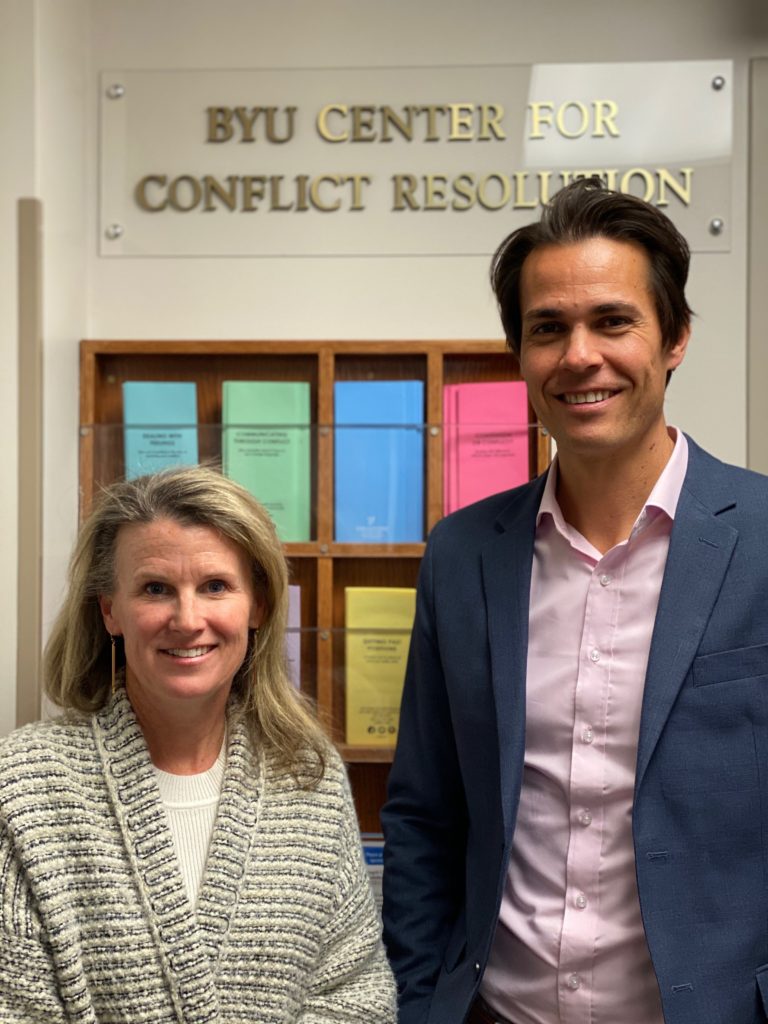
The BYU Center for Conflict Resolution, an on-campus resource for housing disputes and interpersonal problems, changed its name to Center for Peace and Conflict Resolution in order to reflect recent efforts to promote peace on campus and in the world.
“We felt that adding peace to the name helps capture more what we’re doing,” director Benjamin Cook said. The new name also fits in nicely with BYU’s motto, “the world is our campus,” he added.
The name change was suggested by the center’s assistant director, Emily de Schweinitz Taylor, who has been with the center since January 2019. “I was frustrated that people coming in just thought about the conflict,” she said. “How you frame things sets the tone for what they expect.”
In a conflict adverse culture, people tend to assume that a peacemaker is someone who only self-sacrifices and usually avoids conflict, Taylor said. “Really, being a peacemaker is about learning to address conflict in constructive ways.”
Cook said he felt that the center was being underutilized as a resource on campus when he became director in 2015. “I felt like it had a lot of capacity and potential to have a bigger impact,” he said. “We see the center as having a bigger role in promoting peace on campus and around the world.”
Prior to Cook’s arrival, the center existed primarily to help resolve housing disputes between landlords and tenants by providing mediation and arbitration services.

According to Taylor, resolving housing disputes remains a core function of the center, but the center is expanding its services by engaging and educating students in peace-building.
The center is creating resources for students who are interested in peace-building for a career. Through the development of a network and database, Cook hopes students will be better connected with professional opportunities in peace-building.
“If you’re somebody who’s interested in peace-building, whether you’re an undergrad or a law student, what does that look like?” Cook said. “What are summer internship opportunities, or what kind of organizations are doing peace-building work? That’s something we think is really important.”
The center also works closely with the BYU Peace and Conflict Resolution Society to help organize events that bring people with peace-building experiences or training to campus. Recently the center hosted a training on effective communication between members of opposing political parties.

Additionally, the center is working with student researchers studying peace-building and conflict resolution. “We want students to know that we are seeking out opportunities for students to present peace-building research at national conferences and carve out peace-building careers,” Taylor said.
Some of the center’s other resources include help with interpersonal conflicts, such as issues with roommates. “We have people who can consult with you and help with even small conflicts,” Cook said.
International relations student Joseph Smith said the center has been a phenomenal resource to him at BYU.
“On a personal level as well as for other projects I’m involved in, it’s been incredibly useful in regard to conflict resolution,” he said. “There have been times where I’ve been able to go in and ask for advice, ask for strategies and then have them review some of the things that I’m doing, and it’s invaluable.”
Smith said when students realize there’s a place on campus where they can not only resolve interpersonal conflicts but also gain some valuable life skills, he doesn’t see any reason why it wouldn’t be full all the time.
Cook and Taylor continue to search for ways to improve the center. This summer they will receive training on how to replicate other universities’ peace-building programs from the Kroc Institute for International Peace Studies at Notre Dame.
“We would like BYU to become known as experts in peace-building. We think that aligns with the school’s mission,” Taylor said.
The Center for Peace and Conflict Resolution is located at 4412 WSC. Though the name change is official, updates to the center’s website and materials may not take place until summer 2020.




